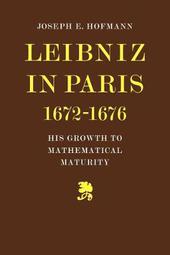
|
Leibniz in Paris 1672-1676: His Growth to Mathematical Maturity
Paperback / softback
Main Details
| Title |
Leibniz in Paris 1672-1676: His Growth to Mathematical Maturity
|
| Authors and Contributors |
By (author) Joseph H. Hofmann
|
| Physical Properties |
| Format:Paperback / softback | | Pages:392 | | Dimensions(mm): Height 229,Width 152 |
|
| Category/Genre | History of mathematics |
|---|
| ISBN/Barcode |
9780521081276
|
| Classifications | Dewey:510.92 |
|---|
| Audience | | Undergraduate | | Professional & Vocational | |
|---|
| Illustrations |
Worked examples or Exercises
|
|
Publishing Details |
| Publisher |
Cambridge University Press
|
| Imprint |
Cambridge University Press
|
| Publication Date |
18 September 2008 |
| Publication Country |
United Kingdom
|
Description
When Gottfried Wilhelm Leibniz first arrived in Paris in 1672 he was a well-educated, sophisticated young diplomat who had yet to show any real sign of his latent mathematical abilities. Over his next four crowded, formative years, which Professor Hofmann analyses in detail, he grew to be one of the outstanding mathematicians of the age and to found the modern differential calculus. In Paris, Leibniz rapidly absorbed the advanced exact science of the day. During a short visit to London in 1673 he made a fruitful contact with Henry Oldenburg, the secretary of the Royal Society, who provided him with a wide miscellany of information regarding current British scientific activities. Returning to Paris, Leibniz achieved his own first creative discoveries, developing a method of integral `transmutation' through which lie derived the 'arithmetical' quadrature of the circle by an infinite series. He also explored the theory of algebraic equations. Later, by codifying existing tangent and quadrature methods and expressing their algorithmic structure in a `universal' notation, lie laid the foundation of formal 'Leibnizian' calculus.
|